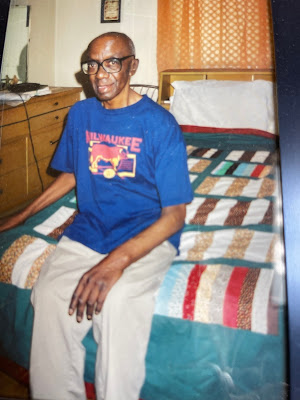Thursday, December 29, 2022
In bed at 10:30, awake at 4:30, half awake till 5:50, 5 pss, one cognac. Back ache, loud tinnitus. 40 degrees, expecting 49, cloudy all day, Sunrise 7:23, sunset 4:24., 9 hours, 1 minute.
Opening the Laptop. I should give more thought to the tabs I leave open when I close the laptop for the night for that is the tab I will see when I open the laptop at whatever hour I lumber out of bed. This morning I opened to The Atlantic and Nicole Davidoff's "Poverty is Violent," but after finishing that feature I turned to Nicole Chung's newsletter I Have Notes. I followed a link to reviews of her memoir A Living Remedy and its story of our inadequacy and inequality of health care, which led to her parents' early deaths. It reminded me of my good friend Roland Wright, a fellow parishioner at St. Francis of Assisi parish in the inner city. Roland was my first pickup and last drop-off during the years I drove the church van every Sunday. I sat in the driver's seat, Roland 'rode shotgun.' Over several years, we became good friends. He was poor, Black, a recovering alcoholic, a resident of public housing for the elderly at the Convent Hill 'project,' a quiet man of deep modesty and of deep gratitude, a former alcoholism counselor who carried in his heart a burden of guilt, of sin. He had lived with his father in his drinking days and one night there was a smoky fire in their residence that killed his father. Roland was so drunk he slept through it and survived, I'm not sure how, but he blamed himself and his drunkenness for his father's death. At some point, I noticed that Roland didn't seem well and I asked him about it. For a time he denied that he was ill but eventually admitted to me that he had esophageal cancer. He had no car and reluctantly agreed to my driving him to his medical appointments and accompanying him during his sessions with his doctors. I remember how taken aback I was when his oncologist at Mt. Sinai told him his cancer was incurable, that 'it will take your life.' He said it coldly, unemotionally, or, as it seemed to me sitting there next to Roland, almost brutally. I wondered if he was like that with all his terminal patients or only with his poor, Black, Medicare/Medicaid patients who live in public housing. On reflection, I think I was too harsh in my judgment. The doctor's job was one that none of us would volunteer for and he surely knew better than I did how such news is best delivered. I also accompanied Roland to other medical appointments at an inner city senior center, the Clinton Rose Senior Center on 3td Street (now MLK Drive) and Burleigh Avenue. The patients there were all poor, all Black. The rotating doctors were all doing charity work. Roland's medical file was thick, not surprising for an old man who had attended this medical clinic for years, but I wondered how much attention the attending physician could give to the information in that file. As I recall, the wait to see the doctor was long but I'm not really sure, it was a long time ago and my memory is poor. I had a bit of a struggle to pull up Roland's name from my sclerotic hippocampus and amygdala. Soon Roland couldn't swallow and I and a nurse at the housing project who also happened to be a parishioner at St. Francis shared the duty to visiting him in his apartment, grinding up his pills, mixing them into his protein drinks, and pouring them into his "g-tube" implanted into his stomach. Eventually he had to be moved to a local inner city nursing home. I drove him there and visited him regularly as he quickly (as best I can recall) became so doped up or 'medicated' that he was uncommunicative. Roland had no family, at least none that we knew of. At his funeral mass at St. Francis, which was well attended because he had friends there, the eulogies were delivered by the nurse and by me. I don't have a copy of mine anymore, but I remember its gist: that in his life, Roland refused to accept any praise but now I was free to heap praise on this good, kind, gentle man. His burial was attended only by Father Matthew Gottschalk from the House of Pease, me, and one other person whose identity I can't now recall. I still have the crucifix from his casket and on the shelf in my painting area I keep a small photo of him sitting on his bed in his little apartment. My experiences with Roland opened by eyes to the challenges of health care for the poor, especially the elderly Black poor. It's not that there is no health care available, though one wonders what would be the case without the "socialist' Medicare and Medicaid programs, but there are real challenges just accessing it. In my life, I had the same primary care physician, Kathleen Baugrud, for more than 25 years. I had the same gastroenterologist for my Barrett's esophagus, the son of a lawyer I knew in law school and agasint whom I had litigated a case. I always had my own car to get me to and from appointments. I had my own insurance, my own income adequate to pay co-pays and deductibles and uncovered expenses. Roland and I lived in very different worlds mainly because he was born poor and Black and I was born poor and White. White Privilege = Not Being Black in America.
New Record for Goldfinches. 15 or 16 on the niger feeder at one time.
POVERTY IS VIOLENT: Why are so many Black men shot to death in certain American neighborhoods? By Nicholas Dawidoff, The Atlantic, 12/28/22


No comments:
Post a Comment